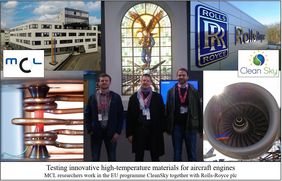High fuel efficiency and lower overall weight requirements call for lighter materials that endure even higher turbine speeds and higher temperatures than the materials used today.
Recently, Titanium-Aluminide (TiAl) alloys were developed that are half the density of Nickel-based alloys which they could replace while still being able to operate at temperatures up to 750°C.
- But will the new alloys withstand the loads in the aircraft engines?
- What happens if harmful service conditions cause a small dent on a TiAl turbine blade rotating at approx. 10.000 rpm at a high temperatures?
- How long will it take for a small crack that is only a few µm long to grow until the part fails?
To answer such key questions, researchers at Materials Center Leoben Forschung GmbH have set up so-called „fatigue crack growth measurements“ at temperatures up to 800°C in close collaboration with Rolls-Royce plc in Derby, UK.
Within the project „TiAlCracks“ (funded within the Horizon 2020 Joint Undertaking CleanSky2) next-generation TiAl alloys are tested at various temperatures and load conditions; the test results are an important input to the design process of the IP turbine of the UltraFan engine.
Dr. Sven Eck
Project manager & MCL management assistant
Materials Center Leoben Forschung GmbH (MCL)
Roseggerstraße 12, A-8700 Leoben
Tel.: +43 3842 45922 27, Fax.: +43 3842 45922 500
Email: sven.eck(at)mcl.at
Images and copyrights:
Top left: MCL – building, ©MCL
Bottom left: HT –cyclic testing at MCL ©MCL
Center image: MCL researcher at a visit of the Rolls-Royce visitor center in Derby, UK; from left to right: Dr. Christian Tritremmel, Dr. Sven Eck, Dr. Jürgen Maierhofer; ©MCL
Top right: Rolls-Royce building, Derby ©Rolls-Royce plc, taken from: https://www.marketingderby.co.uk/news-library/2017/6/8/new-data-centre-for-rolls-royce
Bottom right: The Rolls-Royce Trent 800 engine, ©Rolls-Royce plc, taken from: https://www.flickr.com/photos/rolls-royceplc/14336883124/in/album-72157645038479803/



















